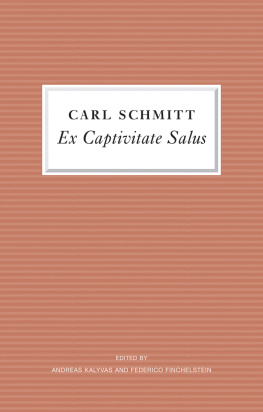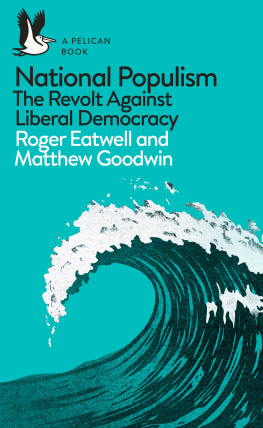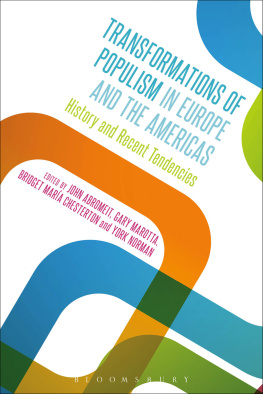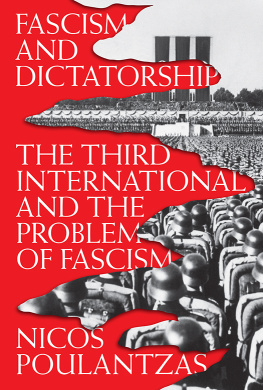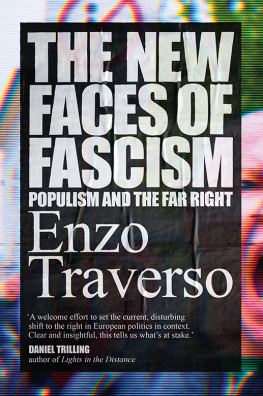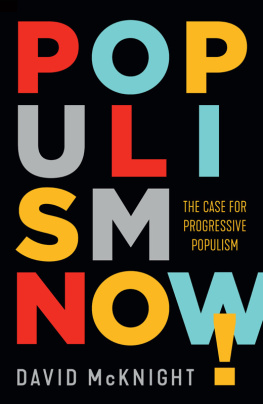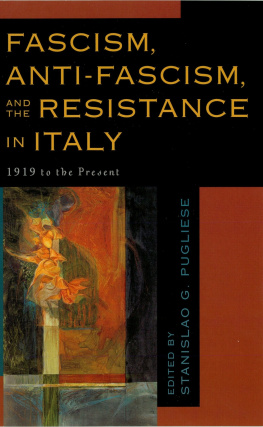Finchelstein - From Fascism to Populism in history: with a new preface
Here you can read online Finchelstein - From Fascism to Populism in history: with a new preface full text of the book (entire story) in english for free. Download pdf and epub, get meaning, cover and reviews about this ebook. City: Oakland;CA, year: 2019, publisher: University of California Press, genre: Politics. Description of the work, (preface) as well as reviews are available. Best literature library LitArk.com created for fans of good reading and offers a wide selection of genres:
Romance novel
Science fiction
Adventure
Detective
Science
History
Home and family
Prose
Art
Politics
Computer
Non-fiction
Religion
Business
Children
Humor
Choose a favorite category and find really read worthwhile books. Enjoy immersion in the world of imagination, feel the emotions of the characters or learn something new for yourself, make an fascinating discovery.
- Book:From Fascism to Populism in history: with a new preface
- Author:
- Publisher:University of California Press
- Genre:
- Year:2019
- City:Oakland;CA
- Rating:4 / 5
- Favourites:Add to favourites
- Your mark:
- 80
- 1
- 2
- 3
- 4
- 5
From Fascism to Populism in history: with a new preface: summary, description and annotation
We offer to read an annotation, description, summary or preface (depends on what the author of the book "From Fascism to Populism in history: with a new preface" wrote himself). If you haven't found the necessary information about the book — write in the comments, we will try to find it.
Finchelstein: author's other books
Who wrote From Fascism to Populism in history: with a new preface? Find out the surname, the name of the author of the book and a list of all author's works by series.
From Fascism to Populism in history: with a new preface — read online for free the complete book (whole text) full work
Below is the text of the book, divided by pages. System saving the place of the last page read, allows you to conveniently read the book "From Fascism to Populism in history: with a new preface" online for free, without having to search again every time where you left off. Put a bookmark, and you can go to the page where you finished reading at any time.
Font size:
Interval:
Bookmark:

Federico Finchelstein

UNIVERSITY OF CALIFORNIA PRESS
University of California Press, one of the most distinguished university presses in the United States, enriches lives around the world by advancing scholarship in the humanities, social sciences, and natural sciences. Its activities are supported by the UC Press Foundation and by philanthropic contributions from individuals and institutions. For more information, visit www.ucpress.edu.
University of California Press
Oakland, California
2017 by Federico Finchelstein
Library of Congress Cataloging-in-Publication Data
Names: Finchelstein, Federico, 1975 author.
Title: From fascism to populism in history / Federico Finchelstein.
Description: Oakland, California : University of California Press, [2017] | Includes bibliographical references and index. |
Identifiers: LCCN 2017006846 (print) | LCCN 2017014268 (ebook) | ISBN 9780520968042 (Epub) | ISBN 9780520295193 (cloth : alk. paper)
Subjects: LCSH : Fascism. | Populism.
Classification: LCC JC 481 (ebook) | LCC JC 481 .f518 2017 (print) | DDC 320.53/3dc23
LC record available at https://lccn.loc.gov/2017006846
Manufactured in the United States of America
25 24 23 22 21 20 19 18 17
10 9 8 7 6 5 4 3 2 1
A Gabi, Luli, y Laura
It is known that personal identity resides in memory, and the annulment of that faculty is known to result in idiocy.
Jorge Luis Borges, History of Eternity (1936)
Some months before Donald Trump became the president of the United States, I found myself in Dresden surrounded by a mix of German neo-Nazi and xenophobic populist demonstrators. I had come to the city with my family to lead a seminar on fascism and populism at the citys university. As fate would have it, we arrived on Monday, the day that the Patriotic Europeans against the Islamization of the West (Pegida) held its weekly demonstration. Racist flags and angry faces encircled us. Literally, one of the most extreme examples of current populism was now standing between the hotel and us. At this point, my eldest daughter, who was eight years old at the time, asked Are these the Nazis that killed Anne Frank? We had visited the Anne Frank Museum in Amsterdam the previous year, and she had been quite affected by her story. No, I answered, they are not her killers, but these neo-Nazis are happy she was killed. The identification of extreme right neo-fascists and populists with Too many people had been disappeared. But like many other citizens, I am asking them now, when populists occupy the global stage.
The first modern populist regime was born in Argentina, not the United States, but lately the worlds greatest power is the one brandishing its populist might to the rest of the globe. This is something many Americans, including most social scientists, had previously deemed impossible. Having lived in the United States since 2001, I have often been told that neither populism nor fascism could ever set foot north of the Rio Grande. But especially now that populism has taken hold in the United States, the global histories of fascism and populism offer key lessons that we should bear in mind as we enter a new era of populism in America and beyond.
If we return populism to its global history, the apparently unexpected can be better understood. This book examines the historical connections between fascism and those in power in the context of populist democracies.
Like other historians who have dedicated their academic lives to the study of fascism and populism, I have always thought studying the past could illuminate the present, and for the last two decades, my work has looked backward to understand the problematic relationships among fascism, populism, violence, and politics. Now the question of fascism and power clearly belongs to the present.
Crisis, xenophobia, and populism characterize our new century. But these traits are not new nor were they simply reborn in our present. To understand the apparent rebirth of populism is, in fact, to comprehend the history of its adoption and reformulation over time. This history starts with fascism and continues with populism in power. If this century has not left behind the history of violence, fascism, and genocide that was so central to the twentieth century, dictatorship, and especially fascistic dictatorships, has nonetheless increasingly lost legitimacy as a form of government. Inflated metaphors of Munich and Weimar aside, we are not witnessing the return of fascism as it existed before. The past is never the present. Yet the current expressions of neofascism and populism have important histories behind them, and the passage from fascism to populism over time has shaped our present. This book argues not only that contextual public and political uses of fascism and populism are key to understanding them but also that studying how these histories have been conceived and interpreted will refresh our awareness and increase our understanding of the current political threats to democracy and equality. Contexts and concepts are key.
This book counters the idea that past and present-day experiences of fascism and populism can be reduced to particular national or regional conditions. It argues against dominant American and Eurocentric views. Especially in light of the historical turning point of Trumps populist victory, tales of American democratic exceptionalism have finally been put to rest. This new age of American populism shows clearly that the United States is like the rest of the world. Similar arguments can be made for French or German democratic culture. We now have no excuse to allow geopolitical narcissism to stand against historical interpretation, especially when analyzing ideologies that cross borders and oceans and even influence each other.
I present a historical take on populism and fascism but also offer a view from the south. In other words, I ask what happens to the center when we think about it from the margins. Neither populism nor fascism is exclusively European, American, or Latin American. Populism is as American as it is Argentine. By the same token, fascism also took hold in Germany and in India. In the United States and in Europe, too many scholars explain the past and present of fascism and populism by narrowly emphasizing the American or European dimensions of what is in fact a global and transnational phenomenon. Decentering the history of fascism and populism does not mean adopting a single alternative explanation for their origins. All histories are important.
What is fascism and what is populism? These questions were first asked by some fascists, antifascists, populists, and antipopulists to validate, criticize, or distance themselves from the perceived common features associated with the terms. Their supporters, Then and now, actors and interpreters alike have agreed that both terms have been counterposed against liberalism; that both involve a moral condemnation of the liberal democratic order of things; and that both represent a mass response advanced by strong leaders in the name of the people, and against elites and politics as usual. But beyond these affinities, and moving past ideal types and the limits of generic interpretations, how have fascism and populism been connected historically and theoretically, and how should we address their significant differences? This book provides historical answers to these questions. While fascism and populism are at the center of political discussions, and are often conflated, they actually represent alternative political and historical trajectories. At the same time, fascism and populism are genealogically connected. They belong to the same history.
Font size:
Interval:
Bookmark:
Similar books «From Fascism to Populism in history: with a new preface»
Look at similar books to From Fascism to Populism in history: with a new preface. We have selected literature similar in name and meaning in the hope of providing readers with more options to find new, interesting, not yet read works.
Discussion, reviews of the book From Fascism to Populism in history: with a new preface and just readers' own opinions. Leave your comments, write what you think about the work, its meaning or the main characters. Specify what exactly you liked and what you didn't like, and why you think so.




